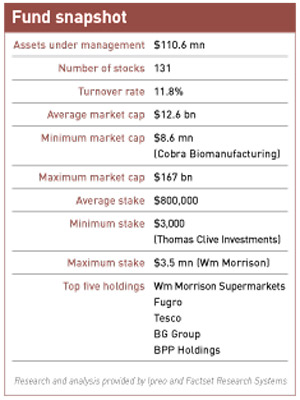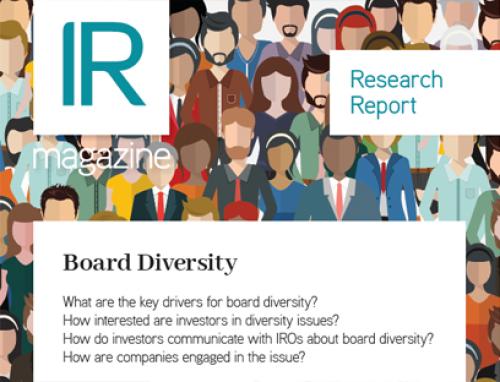Susan Round, fund manager at ethically-run Allchurches Amity Fund, talks about how they choose their investments
If you’ve never heard of the diminutive Allchurches Amity Fund, you’re not alone. Allchurches has traditionally spent the bare minimum on marketing and a near-faceless media profile reflects this lack of presence. But fund manager Susan Round – one of the UK’s most experienced ethical fund managers, and one who has been at the helm of her own fund since its launch – has quietly been supplying investors with solid returns for more than 20 years.
Originally trained as a buyer for high street retailer DH Evans (a ‘suffocating’ experience), Round worked for investment trust specialist Philip Hill before joining Allchurches in the mid-1980s. ‘We’re stock pickers with a real bias to value,’ she says. ‘We do our own work. It’s very much fundamental analysis, and quite an old-fashioned approach; no whizzy black box anywhere.
‘We like to see lots of cash flow and strong balance sheets you can actually understand. And well-covered dividends – we’re not out to make a quick buck. We sometimes have to ride the rough with the smooth. We stick with it.’
As an SRI investor, Round is familiar with the ever-shifting shades of gray and not-so-gray with her modest $110.6 mn fund. Child labor, she says, is certainly an issue where western investors have got used to laying down the law. ‘People come at it from all sorts of angles,’ she explains. ‘You can’t impose your culture. In some areas it’s normal – in cocoa production, say – for kids to help out on a part-time basis. What you can do is ensure the kids are being educated, that this is happening alongside the work in a structured way.’
One company she’s invested in, UK landscaper Marshalls, sources a great deal of material from India. ‘Practically every man and his dog now has Indian sandstone on his patio,’ Round says. ‘We work with the Ethical Trading Initiative to make sure Indian employees get a fair deal.’
Money matters
Of course, it’s the bottom line that matters, and Round is well aware of the priority to generate good returns. Much of the necessary sifting and winnowing of IR data, attempting to isolate vulnerabilities, is hard work, she says. ‘Sometimes you’re not even sure what the question is you’re after,’ she adds. ‘That’s part of the trouble. We’ve so much information now; there are whole armies of people putting it out. Look at BP: for some time, it painted a picture of how great it was, but it wasn’t watching basic maintenance issues at its production facilities. Asking the question is easy after the event.’
It works the other way, too, says Round. ‘Marks & Spencer (M&S) won many awards for its community work; it ticked all the right SRI boxes,’ she explains. ‘Meanwhile, the company took its eye off the ball and the business went down the pan. We like to see principles with profits.’
Principle concerns
Principles with profits is a great idea but some hard-core SRI investors might wonder why Tesco – one of her top three stocks – is included in Round’s fund. Despite taking a well-publicized lead on CO2 emissions and carbon labeling, Tesco is notorious for whittling supplier margins to the bone in its efforts to keep profits up and prices down.‘You’re right, Tesco is a difficult one,’ Round concedes. ‘I don’t support the view that larger, more complex companies should be excluded, however. Companies such as Tesco can use their size to influence in positive ways – for example, by ensuring common international employment standards are adhered to both as an employer and through its suppliers. The introduction of carbon labeling may also be an imperfect science, but it does directly raise consumer awareness, even if consumers don’t fully understand what it means.’
One-on-one meetings with management are always useful, she adds, but cautions against overdoing the slick presentation, ‘and please don’t avoid the difficult, scratchier questions. Sometimes it’s about being blinded with science and not really getting to the heart of the matter. If you’re asking about reported death rates or accidents, for example, they probably won’t give you that information easily. Often it’s about looking for patterns or trends in certain industries.’
Useful numbers
Group meetings, often overlooked by other fund managers, can also help prize apart the issues. ‘We’re not super-human,’ says Round. ‘We don’t think of everything, so something that sparks a train of thought can be useful.’
This is especially so in such a varied crowd, and the SRI church is certainly broad. ‘Some funds have very different objectives, and some of the pure environmental funds have wildly differing angles,’ Round points out. ‘Yes, there’s some consensus on child labor and minimum wage issues, but there’s a lot less consensus on such issues as oil and mining. We’ve surveyed our own investors to find out what they think of oil firms because most SRI companies avoid this sector.
‘Look beyond the car and the fuel pump and you get a rather different feel, however. What about the plastic your glasses are made of? Play that out to the whole SRI community and you’ll find there isn’t so much agreement.’
Round, like many others, is pessimistic on any early upturn in market sentiment so she’s hanging on to plenty of cash, which comprises almost 10 percent of her fund. But she continues to be supported by favored stalwarts such as pharma business Dechra, which produces veterinary and animal health supplies for most vets across the UK and Europe.
On the other hand, British Polythene has been much more of a disappointment. ‘It was a pioneer with recycling polythene waste, but with demand contraction and rising costs… ,’ Round trails off. ‘It’s still a company supplying plastic sacks to hospitals, however; these things still need to be produced.’










